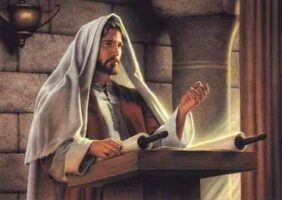V’zot HaB’rachah from a Messianic Perspective

Deuteronomy 33:1-34:12
In this final portion, V’zot HaB’racha, Moses concludes his incredible journey by blessing the tribes of Israel before his departure. These blessings are a momentous culmination as they encapsulate prophetic insights while setting a precedent for the future course of the Israelite nation. While V’zot HaB’racha marks the end of the Torah, it is about both finality and also beginnings, paving the way for the entry into the Promised Land.
Moses delivers individual blessings to each tribe, much like a father bestowing his hopes and visions upon his children. Reuben, Judah, Levy, and every tribe receive words that speak to their individual strengths and the roles they’ll play in the unfolding history. These blessings are more than ceremonial; they’re a reminder of divine purpose and promise that extend through time to touch lives today.
Mount Nebo, often overlooked, plays a critical role in the narrative. From this vantage point, Moses views the Promised Land he longed to enter. It’s a poignant reminder of crossing thresholds and the visionary leadership he exhibited. By reflection, this mirrors Yeshua’s final acts before his ascension. Both Moses and Yeshua provide lasting legacies and show unyielding commitment to God’s people.
Yeshua’s journey also involves giving instruction and encouragement before his departure, much like Moses. Before ascending, Yeshua commissioned his disciples, imparting his final words of encouragement and directives. There’s a thread of continuity between these two figures as they pass on the torch of faith and action to their successors, embodying leadership that’s as relevant now as it was then.
Messianic Insights: Finding Messiah Yeshua in V’zot HaB’racha
Moses’ blessings are rich with prophetic undertones that echo the future coming of the Messiah. These aren’t limited to words aimed at specific tribes; they symbolize broader themes of hope and redemption. When analyzed, these blessings weave a tapestry of expectation that humanity reached towards through the ages until Yeshua’s arrival.
As we look at Yeshua’s role, it closely resonates with the idea of the ultimate high priest, an idea first hinted in the leadership of Moses. Unlike Moses, who couldn’t enter the Promised Land, Yeshua fulfills that journey not for himself but for all believers, offering a spiritual land of promise. This act inspires a belief that encourages perseverance and faith.
One cannot overlook the symbolism of the promised land in Moses’ blessings. To the followers of Yeshua, it embodies the eternal life that He offers. Yeshua’s teachings and actions constantly pointed to a kingdom not of this world, echoing the promise of a land flowing with spiritual milk and honey — a place where divine governance and peace reign.
Don’t let yourselves be disturbed. Trust in God and trust in me. In my Father’s house are many places to live. If there weren’t, I would have told you; because I am going there to prepare a place for you. Since I am going and preparing a place for you, I will return to take you with me; so that where I am, you may be also.
(John 14:1-3 CJB)
And remember! I will be with you always, yes, even until the end of the age.”
(Matthew 28:20b CJB)
Yeshua, before His ascension, blesses His disciples, drawing a parallel to the encouragement Moses gave to Israel. Despite the enormity of their tasks, both Moses and Yeshua imbue their followers with courage and strength. This parallel teaches modern believers the significance of having faith in divine promises, living with hope, and following through on one’s calling.
Living the Message: Life Applications for Followers of Yeshua
Living by the teachings found in V’zot HaB’racha means carrying forward Moses’ blessings into daily life, especially through the lens of Yeshua’s mission. His teachings offer timeless truths, and incorporating these teachings can transform everyday actions and decisions.
Followers are called to take on spiritual leadership roles, taking cues from the leadership styles of both Moses and Yeshua. This involves serving others, prioritizing justice, and nurturing the spiritual welfare of those around us. The idea isn’t to mimic their exact actions, but to emulate the heart of their mission—to act with justice and compassion.
Being a blessing to others is central. Yeshua exemplified this in his interactions, teaching that blessings aren’t mere words but actions that impact others’ lives. Like the blessings Moses gave, our words and actions carry weight, and being mindful of how we influence others can have profound effects.
Faith and hope play pivotal roles in belief systems. Yeshua’s life encouraged walking in faith and rejoicing in hope, setting examples of unwavering belief and positivity. Whether one faces trials or celebrates victories, applying Yeshua’s teachings means living with a focus on divine possibilities and loving one’s neighbor as oneself.
Dale Solberg is a guest writer at Messianic Torah Portion offering a commentary and devotional thoughts from a Messianic Perspective on each week’s Torah reading. His views and opinions do not necessarily reflect those of The Messianic Light. You can reach Dale at dale@messianictorahportion.com.
Unless otherwise noted, Scripture quotations are taken from the Complete Jewish Bible, Copyright © 1998 and 2016 by David H. Stern. Used by permission. All copyrights reserved worldwide.
This post contains affiliate links. Purchases help support Messianic Torah Portion and do not affect the price you pay. Please do not make purchases on the Sabbath.
Messianic Torah Portion is a ministry of The Messianic Light.

Comments
V’zot HaB’rachah from a Messianic Perspective — No Comments
HTML tags allowed in your comment: <a href="" title=""> <abbr title=""> <acronym title=""> <b> <blockquote cite=""> <cite> <code> <del datetime=""> <em> <i> <q cite=""> <s> <strike> <strong>